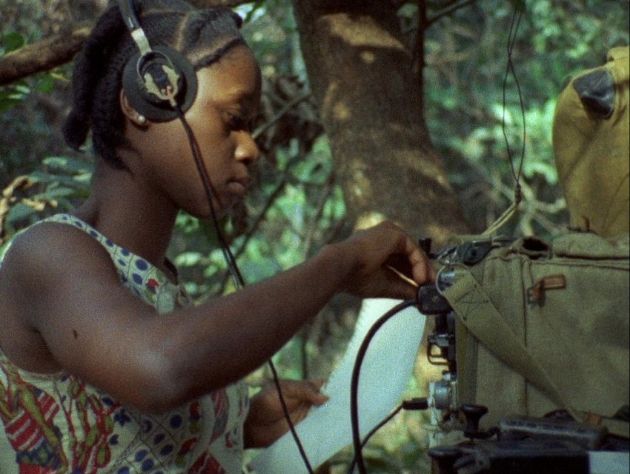
Whew, where do I begin....
Concerning Violence, a new stock footage documentary from Goran Hugo Olsson (Black Power Mixtape) is an extremely sharp indictment on the colonization and its aftermath of the African continent. The matter of fact headiness of Olsson's style may turn off some viewers in its college thesis paper dryness, but one can not deny its power of arresting images and portent words.
Borrowing the text of Frantz Fanon, a Martinique born controversial Afro-French thinker and revolutionary, from his book The Wretched of Earth and powerfully narrated by musician Lauryn Hill as the large white texts appear on screen, the film explains how Europe's five hundred years of exploitation and violent oppression led dehumanization of the whole continent.
Gayatri Chakravorty Spivak, a Columbia professor, opens the film in its preface, noting that Fanon's dissertation and books were rejected and criticized by the likes of Sartre as inciting violence against the colonizing oppressors. She urges us to read between the lines and acknowledge that under murderous colonizing power, the poor and the oppressed were forced to resort to violence in order for change to occur.
A long time admirer of Fanon, Hill came on board to narrate the film for Olsson after he sent her the texts and his idea for the documentary. Here she gives a strong, commanding oration to Fanon's fiery words.
Most of the of footage in the film comes from the Swedish TV archive from the 60s and 70s -- as was the case with Black Power Mixtape, Swedish TV seems to possess great wealth of black experience on film all over the world during that time -- and covers pretty much the whole continent, from Angola to Zimbabwe. The images are upsetting, unforgettable and revelatory.
The film starts with an aerial view of the green field below and the African soldiers senselessly mowing down peacefully grazing cows, Apocalypse Now! style. Then close up of cow as it gets shot to death. The image is shocking and extremely upsetting. This is the legacy of Europe's ruthless colonialism over the continent. And one of the more unsettling images of the film is 'black venus' as Spivak calls it in the preface (she even criticizes the film of its inclusion): a young mother and her suckling baby. She is missing an arm (like Venus de Milo) and the baby is missing a leg, they are both victims of a bomb dropped by government forces. In my opinion, Olsson's fearless approach (and not shying away even from the criticism) is completely appropriate and commendable.
As most African countries gained their independence around the 60s and 70s, the film is a good time capsule; there are a lot of footage of white settlers being interviewed and expressing their views in changing political climates in their large homes with black servants and workers. There are also embedded war journalists filming the carnage of guerrilla wars on both sides. Even though The Wretched of the Earth was published (and subsequently banned) in 1961, Fanon's words are just as relevant today as it was then. In the film's hopeful conclusion, because Europeans, and in turn, Europe aping capitalist Americans, were so successful at dehumanizing the world, Fanon through the hopeful voice of Ms. Hill, calls all African comrades to find the new way to be 'whole human' and completely abandon European approach to build the new post-colonial world.
But Concerning Violence is most impactful when one reflects on the current state of Africa -- kidnappings by Boko Haram and the siege of Timbuktu, and realizes that the death grip of colonialism on the continent is still very hard to pull away from. Along with Joshua Oppenheimer's The Look of Silence, Concerning Violence is one of the best and most potent documentaries I've seen this year.
Concerning Violence is a Kino Lober release. It opens 12/5 at IFC Center, New York
No comments:
Post a Comment